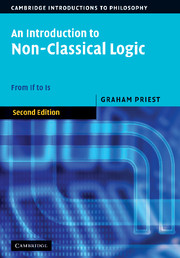Preface to the First Edition
Published online by Cambridge University Press: 05 June 2012
Summary
Around the turn of the twentieth century, a major revolution occurred in logic. Mathematical techniques of a quite novel kind were applied to the subject, and a new theory of what is logically correct was developed by Gottlob Frege, Bertrand Russell and others. This theory has now come to be called ‘classical logic’. The name is rather inappropriate, since the logic has only a somewhat tenuous connection with logic as it was taught and understood in Ancient Greece or the Roman Empire. But it is classical in another sense of that term, namely standard. It is now the logic that people normally learn when they take a first course in formal logic. They do not learn it in the form that Frege and Russell gave it, of course. Several generations of logicians have polished it up since then; but the logic is the logic of Frege and Russell none the less.
Despite this, many of the most interesting developments in logic in the last forty years, especially in philosophy, have occurred in quite different areas: intuitionism, conditional logics, relevant logics, paraconsistent logics, free logics, quantum logics, fuzzy logics, and so on. These are all logics which are intended either to supplement classical logic, or else to replace it where it goes wrong. The logics are now usually grouped under the title ‘non-classical logics’; and this book is an introduction to them.
Information
- Type
- Chapter
- Information
- An Introduction to Non-Classical LogicFrom If to Is, pp. xvii - xxPublisher: Cambridge University PressPrint publication year: 2008
